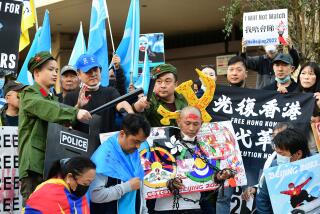Resettling the Uighurs
It’s a high compliment when someone seeks to live in a country that imprisoned and abused him. That’s what five Chinese Muslims held at the Guantanamo Bay detention facility want to do, but they’re encountering resistance from the Justice Department. It is urging the Supreme Court not to review an appeals court decision holding that a judge may not release them into this country.
The Muslims, members of an ethnic group called the Uighurs who want independence from China, had traveled to Afghanistan, where Uighur military training camps had been set up. After the United States launched a military offensive in Afghanistan, they and others were captured by Pakistani and other coalition forces and brought to Guantanamo. Eventually they were exonerated of being enemy combatants and cleared for resettlement.
No one disputes that the Uighurs would be in danger if they were repatriated. It is equally clear to us that, having mistreated these individuals, the United States has a moral obligation to grant them a haven. The Obama administration, however, contends that the only right the Uighurs have is to be resettled abroad.
In its brief urging the Supreme Court not to take the case, the administration notes that the Uighurs were offered resettlement in the Pacific Ocean nation of Palau and another country that has withdrawn its offer because the Uighurs refused to accept it. Other Uighur detainees have been resettled in Palau, Albania, Switzerland and Bermuda. The administration also notes that the Uighurs are seeking U.S. residency outside the usual immigration process.
Poignant as the Uighurs’ predicament is, their case has implications for other detainees who may be cleared of being enemy combatants and who persuade a judge that they should be released into the United States. The appeals court said that “never in the history of habeas corpus has any court thought it had the power to order an alien held overseas brought into the sovereign territory of a nation and released into the general population.” But the Guantanamo Bay Naval Base isn’t “overseas.” According to the Supreme Court, the U.S. maintains “de facto sovereignty” over the territory.
The issues in this case are complicated. Not for the first time, the high court would have to wrestle with the legal fallout of the creation of the Bush administration’s law-free zone. We believe the Constitution allows for the release of the Uighurs into the United States, but if the court is to disagree, it should do so after hearing both sides. The Uighurs deserve at least that much.
More to Read
A cure for the common opinion
Get thought-provoking perspectives with our weekly newsletter.
You may occasionally receive promotional content from the Los Angeles Times.










